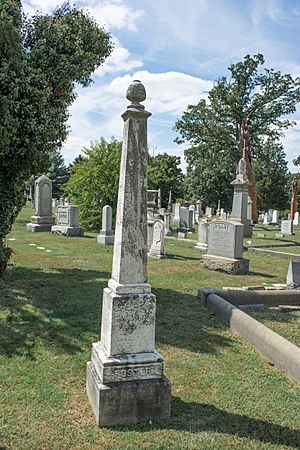A. Lawrence Foster facts for kids
Abel Lawrence Foster (born September 17, 1802 – died May 21, 1877) was an important American politician. He served as a Representative for New York State in the United States government.
Contents
Early Life and Law Career
Abel Lawrence Foster was born on September 17, 1802. His hometown was Littleton, Massachusetts. He later moved to Vernon, New York to study law.
After finishing his studies, he became a lawyer in 1827. He started his law practice in Morrisville, New York.
Time in Congress
Foster first tried to become a member of Congress in 1838, but he did not win. However, in 1840, he was elected to the U.S. Congress. He was a member of the Whig Party.
He served in the 27th Congress from March 4, 1841, to March 3, 1843. During this time, he led a special committee. This committee looked at how money was spent in the Department of the Treasury. He chose not to run for Congress again in 1842.
Life in Virginia
In 1844, Foster moved to a farm in Fairfax, Virginia. Part of his farm is now known as Tysons Corner. In the 1850s, he helped manage local government as a Commissioner for Fairfax County.
During the Civil War
When the Civil War began, Foster supported the Union. He temporarily moved to Washington, D.C. In 1862, he was given a special job. He became a U.S. Indian Agent for the Chippewa of the Mississippi people in Minnesota.
After the Civil War
After the war ended, Foster went back to Fairfax, Virginia. He was chosen as one of three U.S. Tax Commissioners. Their job was to help Virginia rejoin the Union. In this role, he helped arrange the sale of the Robert E. Lee estate to the government. This land is now Arlington National Cemetery.
Later Years and Legacy
In the 1870s, Abel Lawrence Foster's health began to decline. He lived in Washington, D.C., during his final years. He passed away there on May 21, 1877. He was buried in Glenwood Cemetery.
Years later, in the 1890s, Foster's family asked Congress for money. They wanted to be paid for property and supplies that were used or destroyed during the Civil War. In the early 1900s, a special court allowed them to receive some payment for their claim.
 | Tommie Smith |
 | Simone Manuel |
 | Shani Davis |
 | Simone Biles |
 | Alice Coachman |


